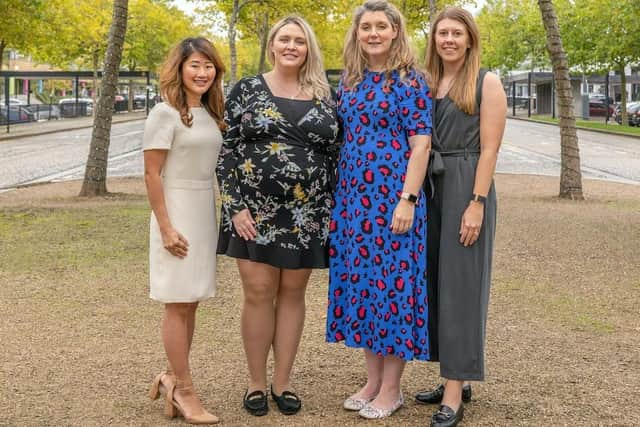Scientists in Milton Keynes raise £2m for ‘3D human lung’ to replace animal testing
and live on Freeview channel 276
Two scientists who have developed a ‘3D human lung’ to replace animal testing on new drugs have secured £2million funding to further their work in Milton Keynes.
The new ‘3D human lung’ has been developed by Dr Abigail Martin and Professor Victoria Hutter, founders of ImmuONE.
Advertisement
Hide AdAdvertisement
Hide AdThe company has just moved into new premises in Milton Keynes thanks to investment from the MEIF Proof of Concept & Early Stage Fund, which will enable it to expand, continue its research and development, and create six new jobs.


The ‘3D human lung’ model was developed by Abigail during her PhD research at the University of Hertfordshire. She joined forces with Victoria, her supervisor, to set up the business in 2019.
They now have around 20 customers globally including blue-chip chemical and consumer products companies. Since its launch the biotech company has generated over £1m in revenue.
Dr Martin said: “Having worked on drug development projects that involve animal testing, I’ve seen the difference that new drugs can make to patients’ lives.
Advertisement
Hide AdAdvertisement
Hide Ad"However, I felt there had to be a better way and set out to look for an alternative. Our model not only enables companies to move away from animal testing but also improves safety for patients too. We look forward to working with many more clients and scaling the business with a view to global expansion in the future.”
ImmuONE enables companies developing new drugs, chemicals or cosmetics to meet legal requirements and show they are safe for consumption and wider use.
Current safety assessments are typically based on animal testing, which is not accurate at predicting the impact on humans, or use human cells taken by lung-scraping, an invasive process that only provides tissue from the upper lung.
ImmuONE’s approach, which involves growing human lower lung tissue and immune cells in a laboratory to create a 3D model, not only enables companies to avoid the use of animals but also allows them to test the impact of their products on the small airways and inflammation in the lung, providing results that are more reliable.
Advertisement
Hide AdAdvertisement
Hide AdThe funding for the project has come from the MEIF Proof of Concept & Early Stage Fund, which is managed by Mercia Ventures and is part of the Midlands Engine Investment Fund (MEIF).
Hannah Tapsell, of Mercia Ventures, added: “Around 90% of drugs shown to be safe and effective in animals do not work as planned in humans, which is one reason for the high failure rate in drug discovery.
"With growing demand for more effective testing models and pressure from consumers to replace animal testing, ImmuONE fills a clear gap in the market. Abigail and Victoria have not only created a powerful innovation but also achieved remarkable success in building a fast-growing business.”
ImmuONE, which has been operating from university premises, is now in talks with a string of other leading brands as part of its expansion.
New laboratories are also to be opened in Stevenage to meet growing demand.